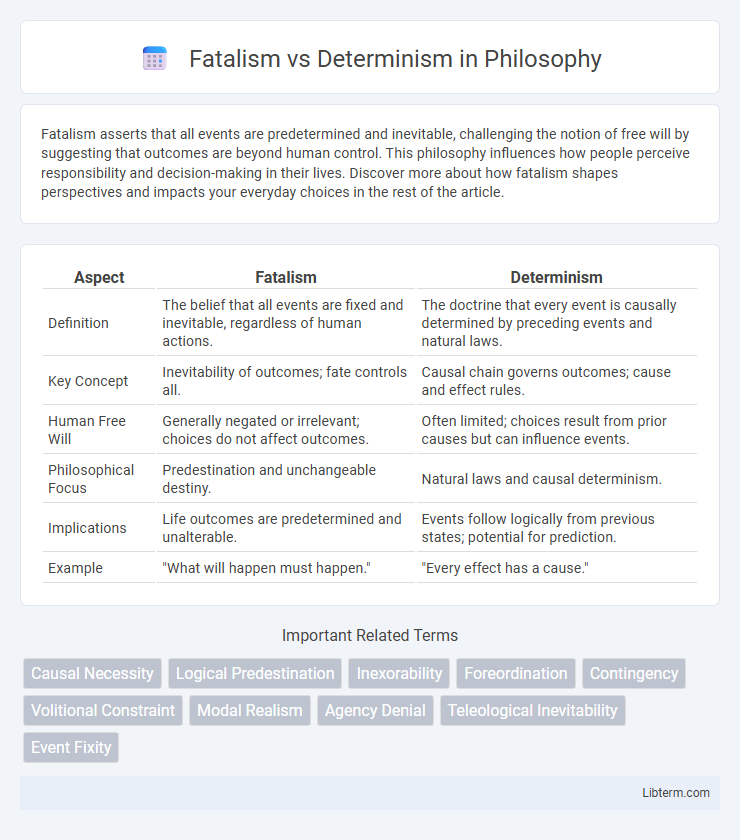Fatalism asserts that all events are predetermined and inevitable, challenging the notion of free will by suggesting that outcomes are beyond human control. This philosophy influences how people perceive responsibility and decision-making in their lives. Discover more about how fatalism shapes perspectives and impacts your everyday choices in the rest of the article.
Table of Comparison
| Aspect | Fatalism | Determinism |
|---|---|---|
| Definition | The belief that all events are fixed and inevitable, regardless of human actions. | The doctrine that every event is causally determined by preceding events and natural laws. |
| Key Concept | Inevitability of outcomes; fate controls all. | Causal chain governs outcomes; cause and effect rules. |
| Human Free Will | Generally negated or irrelevant; choices do not affect outcomes. | Often limited; choices result from prior causes but can influence events. |
| Philosophical Focus | Predestination and unchangeable destiny. | Natural laws and causal determinism. |
| Implications | Life outcomes are predetermined and unalterable. | Events follow logically from previous states; potential for prediction. |
| Example | "What will happen must happen." | "Every effect has a cause." |
Understanding Fatalism: Core Concepts
Fatalism asserts that all events are predetermined and inevitable, rendering human actions powerless to alter outcomes. This philosophy emphasizes the unchangeable nature of fate, often linked to concepts like destiny and divine will. Understanding fatalism involves recognizing its key principle that the future is fixed regardless of individual choices or efforts.
What Is Determinism? Key Principles
Determinism asserts that every event or state is the inevitable result of preceding causes governed by natural laws, emphasizing causality and predictability in the universe. Key principles include causal determinism, where past events determine future outcomes, and logical determinism, which holds that propositions about the future are either true or false. This framework challenges notions of free will by suggesting that all actions are predetermined by prior conditions.
Historical Roots of Fatalism and Determinism
Fatalism traces its historical roots to ancient Greek philosophy, particularly in the works of the Stoics who believed that fate governs all events, rendering human effort powerless against predetermined outcomes. Determinism, with origins in early modern philosophy, was significantly advanced by thinkers like Pierre-Simon Laplace, who proposed that every event is causally determined by preceding events in accordance with natural laws. Both concepts evolved through centuries of philosophical debate, influencing metaphysical discussions about free will and inevitability.
Comparing Fatalism and Determinism: Main Differences
Fatalism asserts that events are fixed and inevitable regardless of human actions, emphasizing predestined outcomes often linked to fate or destiny. Determinism, in contrast, explains that every event is caused by preceding events and conditions, forming a causal chain governed by natural laws. The primary difference lies in fatalism's acceptance of outcomes as unchangeable, while determinism highlights causality and the potential influence of prior states on future events.
Free Will: Where Fatalism and Determinism Collide
Fatalism asserts that all events are predetermined and inevitable, negating free will since outcomes cannot be changed regardless of human actions. Determinism posits that every event results from preceding causes, allowing free will only as an illusion shaped by causal chains. The critical intersection lies in the debate whether deterministic laws eliminate genuine choice or if they coexist with a constrained form of free will.
The Role of Fate in Human Decisions
Fatalism posits that human decisions are predetermined by fate, rendering individual choice an illusion, while determinism attributes decisions to causal chains of events and conditions. In fatalism, outcomes occur inevitably regardless of personal actions, emphasizing a fixed destiny, whereas determinism allows for decisions emerging from prior states of the world. Understanding the role of fate versus causality informs debates on moral responsibility and free will in philosophy.
Scientific Perspectives on Causality and Determinism
Scientific perspectives on causality and determinism emphasize the law-like relationships governing natural phenomena, where events arise from prior conditions according to predictable rules. In classical physics, determinism suggests that if initial conditions are precisely known, future states can be predicted with certainty, whereas fatalism implies inevitability regardless of actions, which lacks empirical support. Modern quantum mechanics introduces probabilistic elements, challenging strict determinism yet maintaining causal consistency through statistical laws rather than absolute predictability.
Philosophical Implications of Fatalism
Fatalism posits that events are fixed and inevitable, challenging the notion of free will by implying that human actions cannot alter predetermined outcomes. This philosophical stance raises questions about moral responsibility, as individuals may be seen as powerless to change their fate. The implications of fatalism demand a reevaluation of ethical accountability and the nature of causality in human decision-making.
Criticisms and Misconceptions of Both Views
Fatalism often faces criticism for implying inevitability regardless of human actions, which undermines moral responsibility and decision-making. Determinism is frequently misunderstood as negating free will entirely, although it primarily asserts that events are causally determined by preceding factors. Both views encounter misconceptions that oversimplify the complex interaction between causality, choice, and freedom, leading to philosophical debates on responsibility and agency.
Modern Relevance: Fatalism vs Determinism Today
Fatalism and determinism remain pivotal in modern philosophical debates, influencing perspectives on free will, moral responsibility, and predictive models in science and technology. Fatalism asserts that outcomes are fixed regardless of human action, while determinism emphasizes causality where all events result from preceding causes, allowing for nuanced interpretations of human agency. Contemporary discussions often intersect with quantum mechanics, neuroscience, and artificial intelligence, highlighting the practical implications of these doctrines in understanding human behavior and decision-making processes.
Fatalism Infographic

 libterm.com
libterm.com